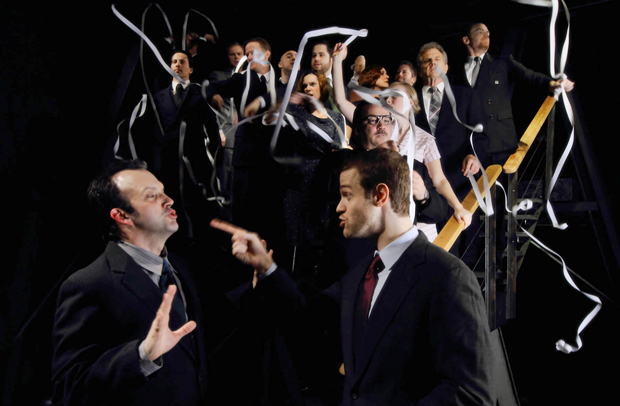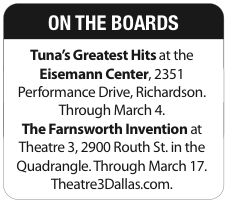From TV to Tuna, Texas, cultural icons at work

LIGHT YEARS AHEAD | David Sarnoff (Jakie Cabe) faces off against TV’s creator Philo Farnsworth (Alex Organ) in T3’s brisk production of Aaron Sorkin’s ‘The Farnsworth Invention.’ (Photo by Jeffrey Schmidt)
ARNOLD WAYNE JONES | Life+Style Editor
There are two indispensable treasures of American culture being dramatized onstage right now: Television itself, and boys of Tuna, Texas.
I can’t imagine life without either.
Television — its history and creation — comes to us via the mind of Aaron Sorkin with The Farnsworth Invention. Philo T. Farnsworth (Alex Organ as an adult) was just an Idaho farm boy when he came up with the essential theories (the use of pixilation, the way to seal a cathode ray tube) that would make television possible. He was in the game for the science.
David Sarnoff (Jakie Cabe) was in it to change the way humans communicate. A wunderkind himself, he saw the potential of TV — and radio for that matter — when everyone else thought of them as novelties for rich folks. Some of Sarnoff’s innovations: playing music and covering breaking news faster than the printed word. (He would have been bowled over by the Internet.) But Sarnoff was practical, and knew that to make his vision of a globalized society work, he needed to control not only the content, but the technology.
 Sorkin, a TV icon with shows like The West Wing, is a master of the Tommy-gun dialogue delivery — a style that works well when you can edit a scene, but does it translate to the stage? It does with Jeffrey Schmidt directing excellent actors like Cabe and Organ, who enunciate so clearly, ever line imprints before they move on to the next. It’s amazing how effortlessly and dramatic you can make complex theoretical science seem when you approach it smartly. (This is the best handling of this kind of material since Theatre 3 did Copenhagen.)
Sorkin, a TV icon with shows like The West Wing, is a master of the Tommy-gun dialogue delivery — a style that works well when you can edit a scene, but does it translate to the stage? It does with Jeffrey Schmidt directing excellent actors like Cabe and Organ, who enunciate so clearly, ever line imprints before they move on to the next. It’s amazing how effortlessly and dramatic you can make complex theoretical science seem when you approach it smartly. (This is the best handling of this kind of material since Theatre 3 did Copenhagen.)
Sorkin takes many dramatic liberties, but what he captures is the conflict between visionaries, both driven not by personal glory but by a desire to make the world better. You want to peg one as the villain, but you end up turning on the idiot box and lamenting that, ultimately, neither succeeded in creating the utopia he imagined.
…………………….
The folks of Tuna, Texas, are more radio-friendly than TV consumers — easier to get your Baptist sermon that way. The resident of Tuna are their own kind of pop icons, anyway. It’s been 30 years since Joe Sears and Jaston Williams first joined forces with co-author/director Ed Howard for Greater Tuna, spawning three sequels and countless converts who appreciation their satiric edge couched in closed minds of West Texas.
Tuna’s Greatest Hits, now at the Eisemann, is a pastiche of the four shows in the Tuna tetralogy, cleaving its plot mostly to the courtship between beset housewife Bertha Bumiller (Sears) and shy radio host Arles Struvie (Williams).
Boiled down like this show is — it covers about 25 years of creativity from first show to fourth — you get to luxuriate in some of the details that may have slipped by: Bertha’s hideously colorful pant suits (fuchsia blouse, chartreuse vest and print bloomers send shivers down the tasteful spine); spot-on metaphors (“shaking like a faith healer”). And they reprise classic lines like good standup comedians or nostalgia musical acts on tour, some updated just enough to remind us of their relevance.
The shows are famed for their dry humor and flatly funny puns (the women’s auxiliary? The Tuna Helpers). But in this breezy 90-minute walk through Patsy Cline territory, it’s the heartfelt sentiment (never cloying) that reminds you what geniuses these guys are — not just gifted actors and savvy comedy writers, but insightful analysts of the Texas mind.
This article appeared in the Dallas Voice print edition February 24, 2012.















